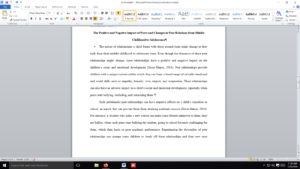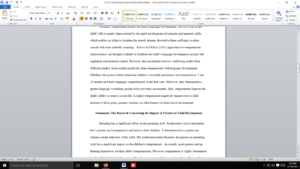Childhood into adolescence
Write a 950-1150 word paper in which you describe changes that occur during middle childhood and adolescence concerning family and peer relationships and how they might influence future development.
Be sure to include the following items in your description:
- Evaluate the effect of functional and dysfunctional family dynamics on development (e.g., family structure, function, and shared and non-shared environments).
- Determine the positive and negative impact of peers and changes in peer relations from middle childhood to adolescence.
- Examine additional pressures faced in adolescence compared to middle childhood.
- Discuss the development of moral values from middle childhood into adolescence.
Include a minimum of two peer-reviewed sources.
Format your paper consistent with APA guidelines
Answer preview
The nature of relationships a child forms with those around them might change as they shift from their middle childhood to adolescent years. Even though the dynamics of these peer relationships might change, these relationships have a positive and negative impact on the children’s social and emotional development (Gross-Manos, 2014). Peer relationships provide children with a unique context within which they can learn a broad range of valuable emotional and social skills such as empathy, honesty, love, respect, and cooperation. These relationships can also have an adverse impact on a child’s social and emotional development, especially when peers start bullying, excluding, and ostracizing them.
[1259 Words]

Childhood into adolescence


